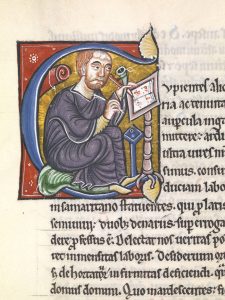“And if those three should come to court, namely God, man, and the devil, the devil and man would have no objection to make against God. For the devil would be convicted of the injury which he did to God by fraudulently stealing and violently retaining his servant, namely man. Man also would be convicted for having done injury to God by holding his commands in contempt and submitting himself to another’s dominion. The devil would also be convicted of the injury to man because first he deceived him with a false promise, and then harmed him by subjecting him to many evils. And so the devil, on his own part, unjustly kept man in bondage, but man justly was so kept; the devil never merited to have power over man, but man, by his fault, merited to suffer the tyranny of the devil.” Peter Lombard, The Sentences, Bk 3. Dist. 20. Chap. 4 (65), trans. Giulio Silano, (Toronto, 2008), p. 86.
Peter Lombard taught theology and philosophy at the Paris schools in the 1140s and 1150s. He became the bishop of Paris before he died in 1159. Here Lombard examines the central teaching of medieval Christianity: the redemption of sinful humanity. Inspired by debates in the cathedral schools and monasteries in western Europe, theologians focused on the nature of Christ’s redemptive act in relation to power and authority.
Lombard’s Sentences became the standard theology textbook in the Western Latin Church until the early 16th century. The Sentences were based on excerpts from well-known theologians, often known as the Latin Church Fathers. Lombard’s favorite theologian, Augustine of Hippo (d. 430), played a major role in his discussions of the doctrine of redemption in his writings too. He focused on the relationship between power and legitimate authority. The devil may have power over humanity by default, but all legitimate authority rests with God.

